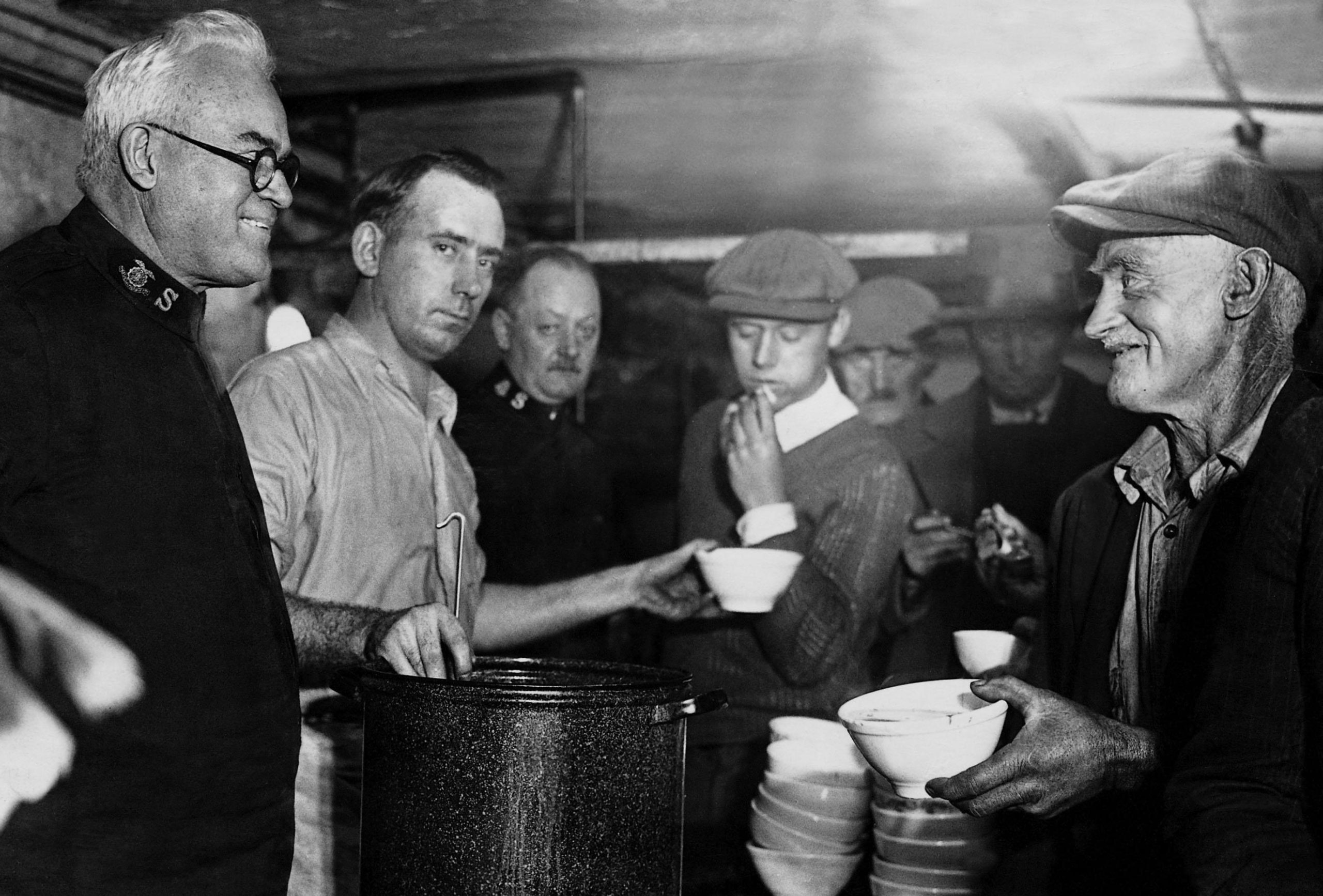
Soup kitchen for the unemployed during the Great Depression, 1930
1929: a time for reform
by Warren L. Maye
In the 1920s, the world enjoyed a growing prosperity, levity, and optimism. In the United States, the era became known as the “Roaring Twenties.” A surging economy, mass consumerism, and an elevated appreciation of the arts and culture was its legacy. Between 1920 and 1929, the nation’s wealth more than doubled and the gross national product (GNP) expanded by 40 percent.
The Salvation Army worldwide also grew exponentially during that time. Evangeline Booth, who was a daughter of William Booth, founder of the Army, was also its charismatic leader in the U.S. Her brother, Bramwell, based in London, served as the Army’s international leader.
“Next to William Booth, Bramwell Booth is the greatest general The Salvation Army has ever had, and whose equal we’re unlikely to see again,” said retired General John Larsson during an interview.
Exponential growth
“William Booth was the visionary, but Bramwell Booth was the mastermind who brought it all together. In those 16 years of his generalship, the number of officers in the world almost doubled. The Army’s work extended to 25 more countries, and its influence and impact grew worldwide. His legacy is secure,” said Larsson of the man who in 1885 had also been instrumental in raising the age of consent for girls in England.
However, catastrophic is the only word that can accurately describe the end of the ‘20s decade. In 1929, an economic bubble burst and sent world markets spiraling into a financial and psychological abyss that would become known as the Great Depression. These events ushered in a new era of reform and accountability on every level and across national borders. The Salvation Army, which reached into the heartlands of many nations, was also influenced by the tide.
A new era
“The changes that the Salvation Army reformers were calling for had to do with the power and authority vested in the office of the General,” said Larsson. “You see, William Booth ruled like an autocrat. When Bramwell Booth succeeded him, he continued in that same style.
“But by the 1920s, there were many who questioned whether that was still appropriate. The Salvation Army had grown into a vast international organization, fighting on 1,000 different fronts.
“Commander Evangeline Booth and the reformers were calling for three specific changes to the Constitution:
“Firstly, that the General should no longer have the right to appoint his successor by means of placing the name of the person he had chosen in a sealed envelope to be opened at his death; secondly, that the generalship should no longer be for life; and thirdly, that the General should no longer be the sole trustee of The Salvation Army assets, but that there should be a group of trustees controlling the Army’s, finances and property,” said Larsson.
The rapidly diminishing health of Bramwell Booth challenged Army leaders to also take a second look at its succession policy. The church had become a multinational entity. The days of it being simply a “Mom and Pop” or even a family–owned ministry were ending.
Maintaining the trust
“With advancing years, Bramwell’s leadership style, instead of mellowing, became more and more autocratic,” said Larsson. “This gave added impetus to Evangeline Booth and the other reformers who were seeking to change the style in which the Army was being led. But Bramwell felt that it was his duty, his God–given duty, to preserve the trust that his father had given to him.
“But then something totally unexpected happened. In May 1928, Bramwell Booth had a health breakdown. At first, people thought, well, he’ll be away for a few weeks and then we’ll be able to keep up the pressure for reform. But the weeks turned into months and his absence from the helm for so long became an issue in the whole 1929 crisis,” said Larsson.
A Booth on the ballot
“Reform, therefore, came to the Army in a painful way,” said Larsson. When Bramwell Booth said “no” to the proposed changes, the organization convened its first “High Council.” All its world leaders met in London to make the Army’s reformation a reality.
Although it was widely believed that Bramwell’s daughter Catherine’s name was sealed in his succession envelope, only two nominees were on the ballot. One of them was Commander Evangeline Booth.
The council’s many days of passionate and heartfelt deliberations, negotiations, and ponderings resulted in Commissioner Edward Higgins, Chief of The Staff, becoming the first elected, rather than appointed, General—on the first ballot, under the new system, and the first outside of the Booth family.
“If Bramwell Booth had brought about that reform, it would have been the crowning jewel in a life of achievement for the Lord and the Army,” said Larsson. “But it was not to be.”
Honoring a leader
Just four months after the end of the High Council, Bramwell Booth was promoted to Glory on June 16, 1929. He was 73. At his funeral, more than 3,000 Salvationists marched in procession and thousands more Londoners lined the streets to show their respect for a popular and much–loved spiritual leader who had coined the name “Salvation Army.”
“What shook the Army also shaped its future,” said Larsson. “Through the events of 1929, The Salvation Army came of age and was set on a path of reform that continues to this day. Therefore, 1929 is part of the heritage of every Salvationist.”

In 1934, Evangeline Booth was elected General by the second High Council. Having been a commander in both the United States and Canada, she brought a wealth of experience and enthusiasm in many areas of the Army’s work, and inspired Salvationists with her vision for the future.
Read 1929: A Crisis That Shaped the Salvation Army’s Future by General John Larsson for the full story of the crisis, with all its astonishing twists and turns based on unpublished documents from The Salvation Army’s Heritage Centers worldwide.
 General John Larsson, a former international leader of The Salvation Army, was promoted to Glory this year. He was a prolific lyricist and songwriter. His book, “1929: A Crisis That Shaped the Salvation Army’s Future” is a classic study of a pivotal moment in the Army’s history. In describing the challenges, Larsson shows readers how to rise above the worst of times by embracing God’s call for deep change.
General John Larsson, a former international leader of The Salvation Army, was promoted to Glory this year. He was a prolific lyricist and songwriter. His book, “1929: A Crisis That Shaped the Salvation Army’s Future” is a classic study of a pivotal moment in the Army’s history. In describing the challenges, Larsson shows readers how to rise above the worst of times by embracing God’s call for deep change.
Read more from the latest issue of SAconnects.




